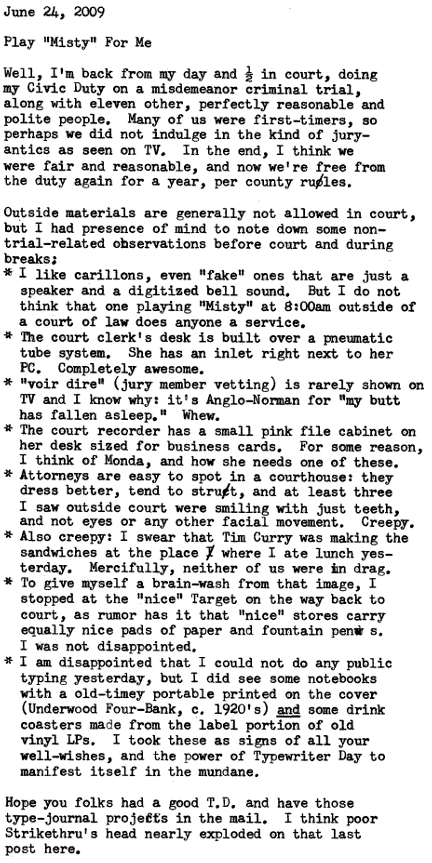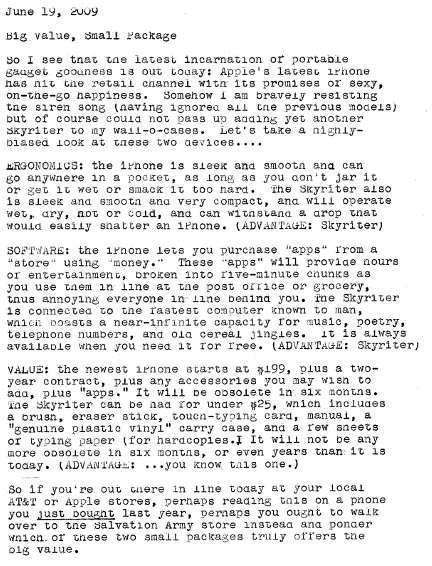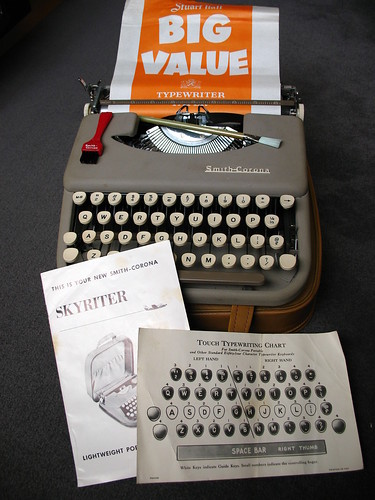- Why does it not surprise me that this local author still drafts by longhand and typewriter? Considering his colorful life, I'd be a little disappointed to find out that he switched to Word.
- Sounds like a collector or an eBay'er might have left a precious item at the gas station at their last fill-up. Interested parties should contact the Town of Ulster police and be prepared to do some splainin'. Typewriters as weapons of mass-hysteria.
- Please take a few moments to read this very interesting article by a Cuban author singing the praises of her old East German-made "Robotron" typewriter, described as "crude, heavy and indestructible."
▼
Friday, June 26, 2009
Lazy Blogging: biographies, bomb scares, and braving hurricanes
A couple of items off the typewriter news feed:
Wednesday, June 24, 2009
Monday, June 22, 2009
Typewriter Day 2009
June 23, 2009
That's tomorrow, folks. Any plans for some public typing? How about finally sitting down and working on that thing for Strikethru's type journal? Me? Looks like I may be celebrating with jury duty. No cell phones or cameras or doodads allowed... wonder what they would think about a Corsair Deluxe?
Update: Decided not to tempt fate and upset the deputies and left the typer at home, and wouldn'tchaknowit, I sat today. I've got a typecast in mind when the case is over in a day or two, kindly raise a type-bar for me in the meantime, everyone!
Friday, June 19, 2009
Big Value, Small Package
Lazy blogging: Typestracts
I've got a longer entry planned for later, but for now enjoy this article on a piece of contemporary typewriter art that is not made by machine disassembly. Reading art analysis always makes my brain feel swimmy, but if nothing else this has given us a new word to use in our retro-loving arsenal. I don't see much on the 'tubes about the artist/poet, Dom Sylvester Houédard, perhaps one of you better-read types can provide more information?
Update: Here is a selection of his works.
Update: Here is a selection of his works.
Tuesday, June 16, 2009
Surviving the Mouse
We're back.
The grand expedition southward to the Land of the Eternal Mickey was a success, despite the soul-deadening drive that is the central valley portion of I-5 and its near-complete dearth of interesting landmarks. The kids are well-exhausted, and the parents are little better, but we've a mighty stack of photos and autographs and princess-related paraphernalia to sift through. I'll be fully back online in a few days, and I'm looking forward to catching up with y'all.
The grand expedition southward to the Land of the Eternal Mickey was a success, despite the soul-deadening drive that is the central valley portion of I-5 and its near-complete dearth of interesting landmarks. The kids are well-exhausted, and the parents are little better, but we've a mighty stack of photos and autographs and princess-related paraphernalia to sift through. I'll be fully back online in a few days, and I'm looking forward to catching up with y'all.
Wednesday, June 3, 2009
Typewriters in the Modern Age
Fellow flickrite Zaynay sent me an email posing this question:
"I was wondering if you would mind sparing any thoughts on the typewriter in today's modern age of digitalization?"
Why yes, I think I can oblige... I'll try hard not to rehash, but instead I'll give a "state of the typewriter union" type post. All you type-minded people please chime in here.
Looking over at this boxy pile in the corner, I'm first tempted to say that typewriters are ballast. Except for the collector or the extremist, there's very little to love about these machines. They're heavy, bulky, messy, oily, typically dusty and rusty, noisy, and often ugly -- how many shades of beige and gray were created just to make these machines as inoffensive as possible in an office setting? The typewriter was invented to impose uniformity and precision to the messy act of reading someone else's hand-writing, and to speed up the act of putting words and numbers on paper. At their worst, they could be seen as a dehumanizing piece of equipment, removing the personal touch from written documents in the name of accuracy. Nobody ever won a prize for being able to churn out longhand in words per minute, but typewriter makers regularly held contests to encourage exactly that, likely for promotional purposes (Mrs. D___ of Des Moines can type 75 wpm on the latest Underwood!) as well as the hope of seeding the typing pools of tomorrow with nimble-fingered young ladies. Why all the fetishism these metal beasts, especially now, in this miraculous time of Internet-connected touch-screen telephony?
Well, there's always the opinion that typewriters are art, of a sort. And I don't mean "crafter" art like keychoppers, or even works by Jeremy Mayer and the like. For a lot of collectors, the typewriter is the ultimate kinetic sculpture. The passage of time has worn away some of the edge from their designs -- well, maybe not the 1970s versions -- and otherwise normal, highly-connected modern folks appreciate the many levers, wheels, gears, and dials as a whole. We may cherish all the machines, but I personally cherish the working ones just a little bit more. And at least for me, the mechanical, manual machines have a true art "essence" or soul. An electric or electronic typewriter just doesn't have that same degree of magic to it, and I certainly don't appreciate it as much. Perhaps it's their dependence on the electrical umbilical that keeps them safely tethered to our desks and walls. Electrics and electronics have secrets that they do not want to share, and they live too close to the "a typewriter is made for work, and work alone" mentality. Electrics were invented to overcome the relative difficultly of using a manual machine, of striking the keys evenly and regularly, of throwing the carriage and advancing the paper. Efficient, but not artistic.
My own floor (and the closet, and the space under the bed) is proof enough that typewriters are artifacts. I will indulge in repeating myself here, but it's completely reasonable to say that you can go out now and pick up a decades-old typewriter for $25 or less, drop a new ribbon in it, and get working right away. I defy you to find a piece of office equipment made today that will last that long, or even ten years. A typewriter was a meant as a companion device, and chances are you could afford exactly one in your lifetime. A typewriter in the modern age is a reminder that life was not always measured in model years and software versions. I don't believe in the "good old days" mentality -- times have always been, and will always be challenging for those that live in them -- but I think a typewriter speaks of a time when manufactures took more pride and care in their products, and customers did the same with their purchases. A modern collector of vintage typewriters is not a good example of someone being frugal with their money or their space, but that collector can certainly appreciate a fine piece of machinery, made to last.
I'll also say that typewriters are still practical. My interest in manual typewriters was triggered by my memories of having my grandmother's old Underwood in my room growing up, which were sparked by reading some posts on the NaNoWriMo forums about the Typewriter Brigade. As a first-time "winner" of the contest, I had to wonder: could a manual typewriter really help? The answer was a resounding yes. Thanks to a professional lifetime frittered away in front of a computer, I've become a passable (if inconsistent) typist, and putting myself into mental lock-down on a machine capable of only one thing -- writing -- was the secret. And I'm not the only one, though I'm probably one of the most vocal/annoying Brigadiers. We're interconnected with one another with a completeness and speed that were unimaginable fifteen years ago. Our poor evolved monkey-brains and -bodies haven't quite mastered how to cope with all of this, though. Despite its original connotations as all-work-and-no play, overwhelmed types like yours truly can sit down at the typewriter and appreciate that it's not sitting there being smarter than me, or waiting impatiently for me to do something. It's just there, a tool totally dependent on my brain and hands and nothing else. Once you've mastered the arcane secrets of "loading the paper" and "setting the margins," a typewriter is instantly useable, and pretty obvious to anyone who has ever spotted a QWERTY in the wild. (Might need to add "using the carriage return" for the txt'ers.) Computers have long taken over the burden of typesetting, and memos, and fussing about manifold copies. Wite-Out and Tipp-Ex bottles have been mercifully allowed to dry out. Perfection is no longer required, and the typewriters can relax and release the poets and novelists within.
--
I'm going to be on a blog-hiatus for a little while, I'll be sure to catch up with all you folks afterwards. Get outside and take some pictures! Or better yet, get outside and take some pictures of your typewriters, then label them with a fountain pen. A retro-trifecta.
"I was wondering if you would mind sparing any thoughts on the typewriter in today's modern age of digitalization?"
Why yes, I think I can oblige... I'll try hard not to rehash, but instead I'll give a "state of the typewriter union" type post. All you type-minded people please chime in here.
Looking over at this boxy pile in the corner, I'm first tempted to say that typewriters are ballast. Except for the collector or the extremist, there's very little to love about these machines. They're heavy, bulky, messy, oily, typically dusty and rusty, noisy, and often ugly -- how many shades of beige and gray were created just to make these machines as inoffensive as possible in an office setting? The typewriter was invented to impose uniformity and precision to the messy act of reading someone else's hand-writing, and to speed up the act of putting words and numbers on paper. At their worst, they could be seen as a dehumanizing piece of equipment, removing the personal touch from written documents in the name of accuracy. Nobody ever won a prize for being able to churn out longhand in words per minute, but typewriter makers regularly held contests to encourage exactly that, likely for promotional purposes (Mrs. D___ of Des Moines can type 75 wpm on the latest Underwood!) as well as the hope of seeding the typing pools of tomorrow with nimble-fingered young ladies. Why all the fetishism these metal beasts, especially now, in this miraculous time of Internet-connected touch-screen telephony?
Well, there's always the opinion that typewriters are art, of a sort. And I don't mean "crafter" art like keychoppers, or even works by Jeremy Mayer and the like. For a lot of collectors, the typewriter is the ultimate kinetic sculpture. The passage of time has worn away some of the edge from their designs -- well, maybe not the 1970s versions -- and otherwise normal, highly-connected modern folks appreciate the many levers, wheels, gears, and dials as a whole. We may cherish all the machines, but I personally cherish the working ones just a little bit more. And at least for me, the mechanical, manual machines have a true art "essence" or soul. An electric or electronic typewriter just doesn't have that same degree of magic to it, and I certainly don't appreciate it as much. Perhaps it's their dependence on the electrical umbilical that keeps them safely tethered to our desks and walls. Electrics and electronics have secrets that they do not want to share, and they live too close to the "a typewriter is made for work, and work alone" mentality. Electrics were invented to overcome the relative difficultly of using a manual machine, of striking the keys evenly and regularly, of throwing the carriage and advancing the paper. Efficient, but not artistic.
My own floor (and the closet, and the space under the bed) is proof enough that typewriters are artifacts. I will indulge in repeating myself here, but it's completely reasonable to say that you can go out now and pick up a decades-old typewriter for $25 or less, drop a new ribbon in it, and get working right away. I defy you to find a piece of office equipment made today that will last that long, or even ten years. A typewriter was a meant as a companion device, and chances are you could afford exactly one in your lifetime. A typewriter in the modern age is a reminder that life was not always measured in model years and software versions. I don't believe in the "good old days" mentality -- times have always been, and will always be challenging for those that live in them -- but I think a typewriter speaks of a time when manufactures took more pride and care in their products, and customers did the same with their purchases. A modern collector of vintage typewriters is not a good example of someone being frugal with their money or their space, but that collector can certainly appreciate a fine piece of machinery, made to last.
I'll also say that typewriters are still practical. My interest in manual typewriters was triggered by my memories of having my grandmother's old Underwood in my room growing up, which were sparked by reading some posts on the NaNoWriMo forums about the Typewriter Brigade. As a first-time "winner" of the contest, I had to wonder: could a manual typewriter really help? The answer was a resounding yes. Thanks to a professional lifetime frittered away in front of a computer, I've become a passable (if inconsistent) typist, and putting myself into mental lock-down on a machine capable of only one thing -- writing -- was the secret. And I'm not the only one, though I'm probably one of the most vocal/annoying Brigadiers. We're interconnected with one another with a completeness and speed that were unimaginable fifteen years ago. Our poor evolved monkey-brains and -bodies haven't quite mastered how to cope with all of this, though. Despite its original connotations as all-work-and-no play, overwhelmed types like yours truly can sit down at the typewriter and appreciate that it's not sitting there being smarter than me, or waiting impatiently for me to do something. It's just there, a tool totally dependent on my brain and hands and nothing else. Once you've mastered the arcane secrets of "loading the paper" and "setting the margins," a typewriter is instantly useable, and pretty obvious to anyone who has ever spotted a QWERTY in the wild. (Might need to add "using the carriage return" for the txt'ers.) Computers have long taken over the burden of typesetting, and memos, and fussing about manifold copies. Wite-Out and Tipp-Ex bottles have been mercifully allowed to dry out. Perfection is no longer required, and the typewriters can relax and release the poets and novelists within.
--
I'm going to be on a blog-hiatus for a little while, I'll be sure to catch up with all you folks afterwards. Get outside and take some pictures! Or better yet, get outside and take some pictures of your typewriters, then label them with a fountain pen. A retro-trifecta.
Tuesday, June 2, 2009
Typewriters are the new brick
I guess this vandal gets points for style, though I can't say that I'm happy with the choice of projectile. I have to admit, though, that diagnosing problems (especially ones that surpass my limited abilities) often put me into this frame of mind:
Unloved and undervalued, once again the lowly typewriter descends into the crime world.
Police Blotter -- Kane County(from Chicago's Daily Herald.)
Someone threw a typewriter through a window of Bygone Days Antiques, 184 W. Main St., Burlington, removed a nailed-down rocking chair from the front porch, and used legs from the chair to break another window and a window on the property's garage, between midnight May 15 and 4 p.m. Friday, according to a police report. A piece of paper in the typewriter had curse words typed on it. The business has been closed for about three years.
Unloved and undervalued, once again the lowly typewriter descends into the crime world.



